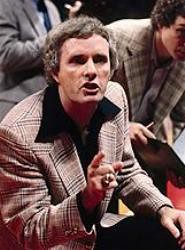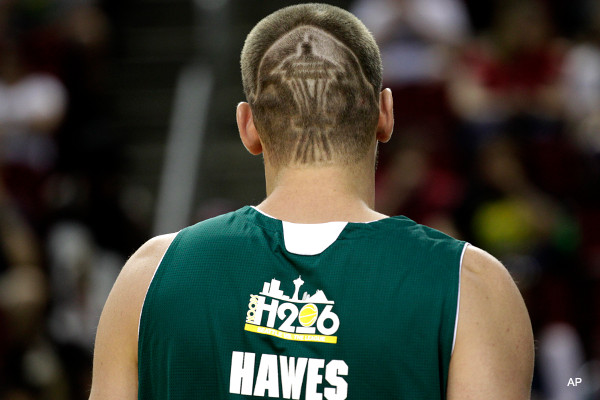2012 Olympic Men's Basketball Qualifying Preview
We're now a year away from the 2012 London Olympics, and we can thankfully look forward to some actual competitive professional basketball as national teams in each FIBA zone (Africa, Americas, Asia, Europe, Oceania) are starting their preparations for the upcoming Olympic qualifying season.
Here are the events, listed chronologically, which will determine the field of 12 teams for the London Olympics (number of qualifying spots available in parens):
- Automatic Qualifiers (2): Great Britain (host), USA (2010 World Champs)
- Afrobasket '11 (1): Aug. 17-28 in Madagascar
- FIBA Americas Championship (2): Aug. 30-Sept. 11 in Argentina
- FIBA Oceania Championship (1): Sept. 7-11 in Australia
- EuroBasket '11 (2): Aug. 31-Sept. 18 in Lithuania
- FIBA Asia Championship (1): Sept. 15-25 in China
- FIBA Olympic Qualifying Tournament (3): July 2-8, 2012, TBD
This FIBA Olympic Qualifying Tournament will consist of the next runners-up from the zones around the world, allocated like so:
- Europe (4)
- Americas (3)
- Africa (2)
- Asia (2)
- Oceania (1)
So, 12 teams will be competing for the last three spots next summer.
All in all, it seems a bit ridiculous that FIBA didn't expand the field from 12 to 16, considering there are so many strong basketball nations around the world, especially considering that the already tight field of 12 has a few automatic bids reserved for the lesser FIBA zones.
In any event, we'll have coverage of Olympic basketball qualifying throughout the summer. Rosters are still being determined and finalized, so for now, here's an early overview of which teams should be contenders to get Olympic berths:
AUTOMATIC
Qualified: USA, Great Britain
Two of the 12 Olympic spots have been claimed by Team USA (reigning World Champ) and Great Britain (host country). 10 Olympic berths are open and seven of those 10 spots will be filled this summer. The U.S. is fortunate that it claimed the World Championship in Turkey last year, so that they don't have to try to qualify for the Olympics with a team on non-NBA players in this lockout summer.
EUROPE
Olympic berths: 1st & 2nd place
Qualifying Tourney berths: 3rd-6th place
The EuroBasket is the granddaddy of them all--the other qualifying tourneys pale in comparsion. 24 teams will convene in basketball-mad Lithuania from Aug. 31-Sept. 18 to determine the king of European basketball.
22 teams are currently set in the field, with Finland, Hungary and Portugal competing in a mini round-robin for the last two spots in August. The field will be divided into four opening round groups of six teams:
- Group A: Britain, Lithuania, Poland, Spain, Turkey, Qualifier
Group B: France, Germany, Israel, Italy, Latvia, Serbia
Group C: Bosnia, Croatia, Greece, Macedonia, Montenegro, Qualifier
Group D: Belgium, Bulgaria, Georgia, Russia, Slovenia, Ukraine
From there, the top four teams apiece in Groups E and F move on to the quarterfinals of the knockout stage. Semis and finals follow. All told, it will require a somewhat absurd 11 games in 19 days to win the tournament.
I wish they would re-draw the field; it's all kinds of lopsided. I would say eight of the top 12 teams are in Groups A and B. Group A is absolutely brutal, the Group of Death, while Group B is nearly as deadly. Meanwhile, Groups C and D are clearly inferior. Groups A and B will combine for what looks to be a monster Group E--much tougher than Group F.
Reigning Euro champ Spain is once again the odds-on favorite to win gold this summer. After disappointing at the 2010 Worlds, Spain basically has the same team that rolled through the knockout phase in '09, with Pau Gasol returning to the national team. And just for overkill, Spain decided to add Serge Ibaka, now a naturalized citizen; I guess they didn't think the Gasol bros. were enough of an advantage.
Lithuania and Serbia are the next favorites to fight it out for the second Euro Olympic berth. Lithuania is coming off a surprising run to the World semis and will have the huge advantage of playing in front of the best fan base in Europe. Lithuania will be without Linas Kleiza, but they have added veterans Saras Jasikevicius, Rimas Kaukenas, Darius Songaila and the Lavrinovic Bros. back into the mix.
Serbia should be strong once again, with nearly the same roster that won the silver at the '09 Euro and was a few kooky plays away from the Worlds final last summer.
Turkey and France would have been non-contenders without their multiple NBA players available. But now that both national teams seemed to have their insurance issues squared away, they can both be considered medal contenders.
Croatia, Germany, Russia and Slovenia are other quality teams that are all capable of finishing in the top six spots. Croatia is currently the favorite to take Group C while Slovenia and Russia should fight it out for Group D supremacy.
Germany vaulted into qualifying contention the moment Dirk (and Kaman) signed on for the summer. In the last two EuroBaskets Dirk played in, he led Germany to a fifth-place finish in '07 (and ultimately qualified for the '08 Olympics) and a silver medal in '05.
Now, after underachieving over the last five years, Italy looks to regain its footing in the upper echelon of Euro teams. Danilo Gallinari joins Andrea Bargnani and Marco Belinelli after being sidelined the last few summers.
While Greece's Olympic chances shrink by day because injuries (Nick Calathes, Vassilis Spanoulis) threaten to decimate their perimeter rotation further, with veterans Dimitris Diamantidis and Theo Papaloukas opting not to play.
Watch out for relative newcomers to the top-level of FIBA Europe, Montenegro and Macedonia. Both team have tough frontcourts with talented naturalized American PGs--Montenegro's Omar Cook and Macedonia's Bo McCalebb.
Also, both teams are beneficiaries of a lucky draw being placed in Group C with an injury-riddled Greece team. Either team could sneak into the second round and even grab one of the four knockout phase spots in Group F.
The Brits are still waiting to hear if Luol Deng and Ben Gordon will obtain insurance. But even if they get their NBAers cleared, just advancing out of the opening round could be a chore with Spain, Lithuania and Turkey in their group.
AMERICAS
Olympic berths: 1st & 2nd place
Qualifying tourney berth: 3rd-5th place
Mar Del Plata, Argentina will host the FIBA Americas Championships from Aug. 30-Sept. 11. I'm not really sure who decided to schedule this tourney at the same time as EuroBasket, but it was a rather poor choice.
10 teams will divided into two opening round groups of five:
- Group A: Brazil, Canada, Cuba, Dominican Rep., Venezuela
Group B: Argentina, Panama, Paraguay, Puerto Rico, Uruguay
Argentina is the clear favorite to win gold at home in a last hurrah for their Golden Generation, if they can get their NBAers' insurance covered. Still no official confirmation if Ginobili, Scola, Delfino and Nocioni are cleared to play (Update: on Friday, it was reported that an insurance deal has been reached for all four), though Fab Oberto will be coming out of retirement to play at home.
The Dominican Republic will be a serious contender for the second Americas Olympic berth with its trio of NBAers (Al Horford, Cisco Garcia & Chuck Villanueva) confirmed for participation and John Calipari directing the squad.
Brazil and Puerto Rico are the other top medal contenders. No Nene, Varejao or Barbosa for Brazil this summer, but they do have Tiago Splitter and Marcelo Huertas available to keep them competitive.
As of right now, it's tough to get a definitive read on Puerto Rico's situation. The backcourt should be fine with JJ Barea and Carlos Arroyo likely to suit up, but the frontcourt could be decimated because of injuries.
After an awful Worlds performance (partly due to a rash of injuries), Canada should fare better this year with Joel Anthony and a healthy Andy Rautins leading the way. Cavs' lottery pick Tristan Thompson will not join Canada this summer but Spurs' draftee Cory Joseph is a possibility to join Team Great White North. And it would help the cause if fellow Spur Matt Bonner can get his Canadian citizenship cleared in time to play, but it's highly unlikely.
It's doubtful Canada will earn one of the two Olympic berths, though they are capable of finishing in the fifth-place slot which will secure a berth into the qualifying tourney next summer.
OCEANIA
Olympic berth: Winner
Qualifying tourney berth: Loser
The Oceania "Championship" (use that term loosely) is simply a best-of-three series between the Aussies and the Kiwis to be played in Australia on Sept. 7, 9 & 11. The winner earns a bid to the Olympics. Even without Andrew Bogut and Dave Andersen, the Australia's Boomers should be the favorites with players like Patty Mills, Joe Ingles, Matt Nielsen and Brad Newley available.
It's past due that this "zone" should just be absorbed into the Asian zone. And ideally an Olympic berth would be transferred over to Europe to give them three auto bids. Australia would arguably be the top team in this reformed Asian zone, but at least they would have to go through a full tournament to earn their title.
In EuroBasket for example, a team has to go through a gauntlet of quality teams and has to slog through a brutal schedule of 11 games in 19 days to win the title. By contrast, giving an Olympic bid to a zone with two teams is laughable.
AFRICA
Olympic berth: 1st place
Qualifying tourney berths: 2nd & 3rd place
If you like your basketball played in exotic locales, maybe you should consider buying tickets to Afrobasket which is being held in Madagascar from Aug. 17-28. Angola is the odds-on fave once again and will likely grab the one automatic Olympic bid given to Africa. Senegal could be Angola's toughest foe while Cameroon, Ivory Coast, Nigeria, and Tunisia are possible medal contenders.
ASIA
Olympic berth: 1st place
Qualifying tourney berths: 2nd & 3rd place
The last of the qualifying tourneys will take place in Wuhan, China on Sept. 15-25. With Yao Ming sadly retired, China is no longer a heavy favorite, but with the services of Yi Jianlian, they will likely still be a slight fave for gold. However, China was pounded by Iran in the '09 Asian title game and Iran (led by Memphis' Hamed Haddadi) will be China's toughest competition this summer. Jordan and Lebanon are the other medal contenders.





